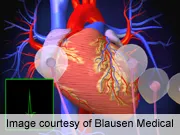Atrial fibrillation can lead to dangerous heart complications
WebMD News from HealthDay

By Dennis Thompson
HealthDay Reporter
MONDAY, Nov. 18, 2013 (HealthDay News) -- Hospitalizations for the most common form of irregular heartbeat nearly doubled between 1998 and 2010, and are expected to continue to soar during the current decade, researchers say.
Ultimately, hospital treatment of atrial fibrillation could cost the United States more than $21 billion in 2020 alone, according to research presented Monday at the American Heart Association's annual meeting in Dallas.
Nearly 4.7 million people landed in the hospital with atrial fibrillation (sometimes called "a-fib") from 1998 to 2010. It's a disorder of the electrical impulses that coordinate the beating of a person's heart, said lead researcher Dr. Sadip Pant, an internist with the University of Arkansas for Medical Sciences in Little Rock.
The number of people hospitalized in 2010 alone represented a 46 percent jump from 1998, according to estimates Pant and his colleagues produced using a national hospital database.
"Right now, we all know that a-fib is a growing epidemic in the United States," Pant said. "The aging population is definitely a major cause of this trend, and with the aging population comes a number of other risk factors."
Other risk factors for atrial fibrillation include obesity, uncontrolled high blood pressure, diabetes and heart failure, Pant said.
Those numbers didn't shock Dr. Mary Ann Bauman, a heart association spokeswoman and a general practice internist in Oklahoma City.
"I know I'm seeing more atrial fibrillation in my practice than I did 10, 15 years ago," she said. "This is not a surprise to me."
Greater awareness of the heart disorder among primary care physicians also could contribute to the increase, Bauman added. More family doctors are detecting atrial fibrillation and sending patients to the hospital to get their heart rates under control.
In the disorder, rapid and disorganized electrical signals cause the heart's two upper chambers -- the atria -- to contract very rapidly and irregularly.
Symptoms include rapid and irregular heartbeat, heart palpitations, shortness of breath, dizziness, sweating, fatigue or chest pain. It's not a fatal disease, but it can increase a person's risk of stroke fivefold. This is because atrial fibrillation allows blood to pool in the atria and form clots, according to the heart association.
Using hospital data, the researchers predict that 541,000 hospitalizations will occur in 2020 because of atrial fibrillation -- 28 percent more than occurred in 2010. "It is increasing exponentially over time," Pant said.
They also ran estimates of the cost of these hospitalizations, concluding that each individual case will cost a little more than $40,000 by 2020. That's a 55 percent increase from 2010.
"It's a very costly disease, and it's going to be even more so in the future," Pant said.
source : Hospitalization Rates Soar for Irregular Heartbeat, Study Finds








